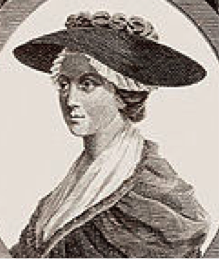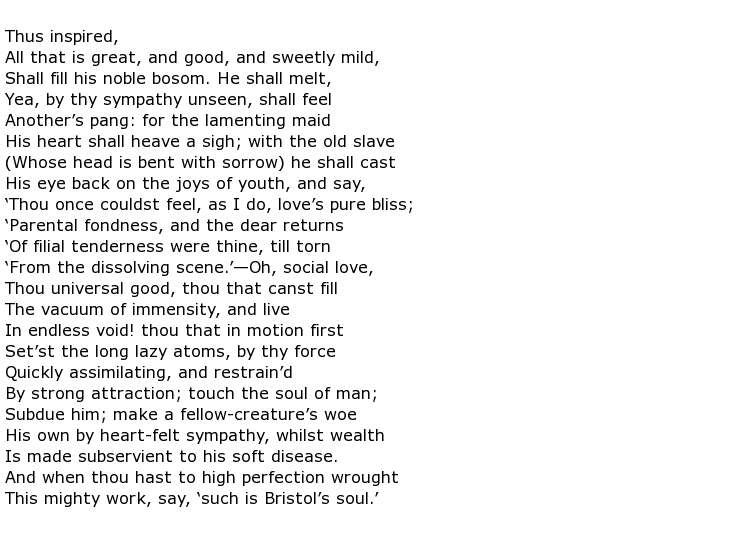 The 18th century English romantic poet Ann Yearsley was remarkable in that she had no education to speak of, having grown up in a fairly rustic environment, and yet she was one of the most accomplished, working class female poets of her day. She married a yeoman farmer and worked as a milkmaid on the farm but, despite these humble beginnings, she published a number of collections of poems, mostly with the help of subscription and the patronage of people like Hannah More and Frederick Hervey, the 4th Earl of Bristol. Like many women in the Bristol area she was also a fervent anti-slavery campaigner.
The 18th century English romantic poet Ann Yearsley was remarkable in that she had no education to speak of, having grown up in a fairly rustic environment, and yet she was one of the most accomplished, working class female poets of her day. She married a yeoman farmer and worked as a milkmaid on the farm but, despite these humble beginnings, she published a number of collections of poems, mostly with the help of subscription and the patronage of people like Hannah More and Frederick Hervey, the 4th Earl of Bristol. Like many women in the Bristol area she was also a fervent anti-slavery campaigner.
She was born Ann Cromartie on the 8th July 1753 in the Clifton district of Bristol. Life was hard at home and she taught herself to read, with some help from a brother, using such texts as Shakespearian plays and epic poems like Milton’s Paradise Lost. When she was old enough she married at the age of 21 and settled to a life as a yeoman farmer’s wife, producing six children for him. After not too long though the family were almost destitute but, despite this, Ann was determined not to neglect her reading and writing. Help came when she came to the attention of the Bristolian philanthropist and poet Hannah More. Miss More took her work and arranged to have it published using the subscription method. She made the following comments about Ann Yearsley:

She also seemed to be astounded with Ann’s skill at interpreting literature with accuracy::

Poems on Several Occasions was her first collection, published in 1785, and featured such themes as ordinary domestic life and religious beliefs. The collection was soon successful but the two women had a disagreement about the sharing of profits and this led to Ann breaking away to pursue an alternative publication route. More always stated that she was more concerned with making sure her protégé survived rather than got rich, knowing what a poor state she had found her not long before. Two years later, supported by the Earl of Bristol, Yearsley published Poems on Various Subjects and, twelve years later, The Rural Lyre: A Volume of Poems came out in 1796.
Before this though she wrote a piece decrying the slave trade which, of course, was huge business in ports like Bristol. In 1788 she published A Poem on the Inhumanity of the Slave-Trade and this became one of her most well-known pieces of work. Here is the final section of this long poem where she describes the torment felt by the slaves:

She followed this with a play (Earl Goodwin: an Historical Play) and a novel (The Royal Captives: a Fragment of Secret History, Copied from an Old Manuscript). By now, relatively well off, she showed her philanthropical side by opening a borrowing library for the public of Bristol in 1793. Despite being seen as an “uneducated poet” Ann Yearsley had done rather well.
Ann Yearsley was widowed in 1803 and moved east to the Wiltshire town of Melksham.
She survived for only three more years unfortunately, and died in 1806 aged 52.

